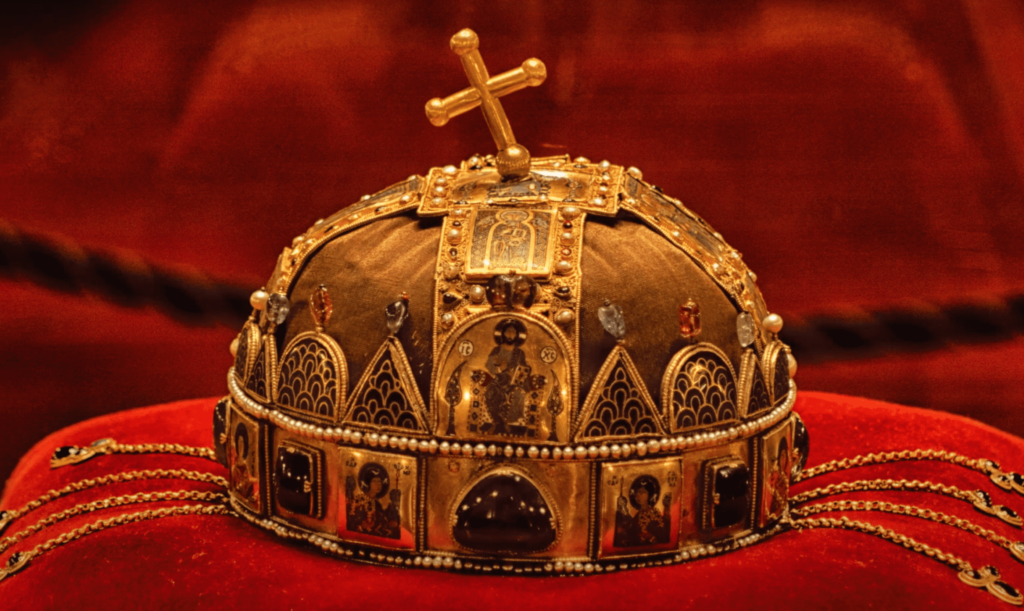St. Stephen, King

I spent yesterday afternoon with Ben Wallace-Wells, a writer for the New Yorker magazine. He flew to Baton Rouge in late August — brave man! — to interview me at length about the interest I have taken in Hungary and its prime minister, Viktor Orban. Orban is a hate figure for American liberals and Establishment conservatives. Wallace-Wells wanted to understand why I feel otherwise about the Hungarian leader.
I won’t get into the answer here — I have blogged a lot about it — but the afternoon spent talking about it did prompt reflections on the moribund state of our culture and civilization. This is because my interest in Orban comes out of frustration and disgust over the inability of American political leadership to meet the crisis with the seriousness and determination it requires. I explained to Wallace-Wells that I don’t believe there is a political solution to this crisis, and I certainly don’t think we are going to vote our way out of it. But I believe that talented, committed political leaders can create the conditions under which non-political forces — chiefly religious ones — can provide rescue.
Today is the Feast of St. Stephen, King of Hungary. He is considered the founder of the Hungarian nation, which came into existence as a state under his rule in the year 1000. Before that, he was a Magyar prince. Both of his parents had been baptized, but Stephen was the first one in the family who was devout.
After succeeding his father Geza, he fought his kinsman Koppany, a bloody conflict that ended with Stephen’s victory, and his coronation on Christmas Day in 1000 (or perhaps 1001) with a crown sent by Pope Sylvester II. You can see this crown on display in the Hungarian Parliament — a material link to the man who first wore it a millennium ago.
Stephen — István, in Hungarian — was a warrior. He united the Hungarian kingdom — all the disparate Magyar tribes — and forced the conversion of his countrymen by the sword. He built churches and monasteries. He died in 1038, and was canonized. Today, in the basilica in Budapest, you can see his preserved right hand:

It would be lovely to say that St. Stephen Christianized his country with sweet persuasion and the power of charitable example, but that didn’t happen a lot in the Middle Ages. The fact that Hungarians of subsequent centuries were able to know and serve the One True God and His Son is because of the deeds of this rough Magyar king. There is a childish impulse today to anathematize our ancestors for not being perfect in every way. This should be resisted. We can and should recognize their flaws while cherishing their virtues. We owe them so much.
The example of St. Stephen the King reminds us that we can’t easily separate religion and politics. I told Ben Wallace-Wells that I was impressed by something Viktor Orban told a journalist once: that as a politician, he can only give people things, but he can’t give them meaning. That is wise, and it would be wise of us to realize those limits in our politicians. When it comes to the faith, all I expect from an American politician is that he or she does everything possible to protect the liberties of the churches (synagogues, mosques) and religious institutions. In Hungary, which is almost entirely Christian, I would expect the state to do more, but the United States is too diverse for that, and besides, America is constitutionally unable to do more.
Viktor Orban is a Calvinist, as are 25 percent of Hungarians. I don’t know whether he is a devout believer, as is his son Gaspar, or whether he is more of a St. Stephen figure. (To be clear, I don’t think any of us know how personally devout the king truly was; I’m simply saying that it’s possible that the national leader can be more Christian in a worldly sense.) Whatever the case, Prime Minister Orban has made it clear that he sees the future of the Hungarian nation depends on the strength of its religious commitment, and its fidelity to its Christian heritage. I admire that, and wish we had more American politicians who understood this. The Church is not the State, but to a significant extent, the Church depends on the State to do its work, if only for the State’s protection.
In the end, Orban’s hopes will fail without a Christian reconversion in Hungary. I told Ben Wallace-Wells that I’m a reader of Michel Houllebecq, and I don’t think that the Western god of shopping and f*cking will be strong enough to defeat whatever rough beast is slouching towards Budapest — and Paris, and London, and Madrid, and Rome, and Stockholm — to be born. History is messy, and so are the lives of historical figures. In his own modern way, in our post-Christian era, Orban, despite his many flaws, is about the most worthy successor of Szent István, Király, that the Magyars could hope for.
Subscribe for as little as $5/mo to start commenting on Rod’s blog.